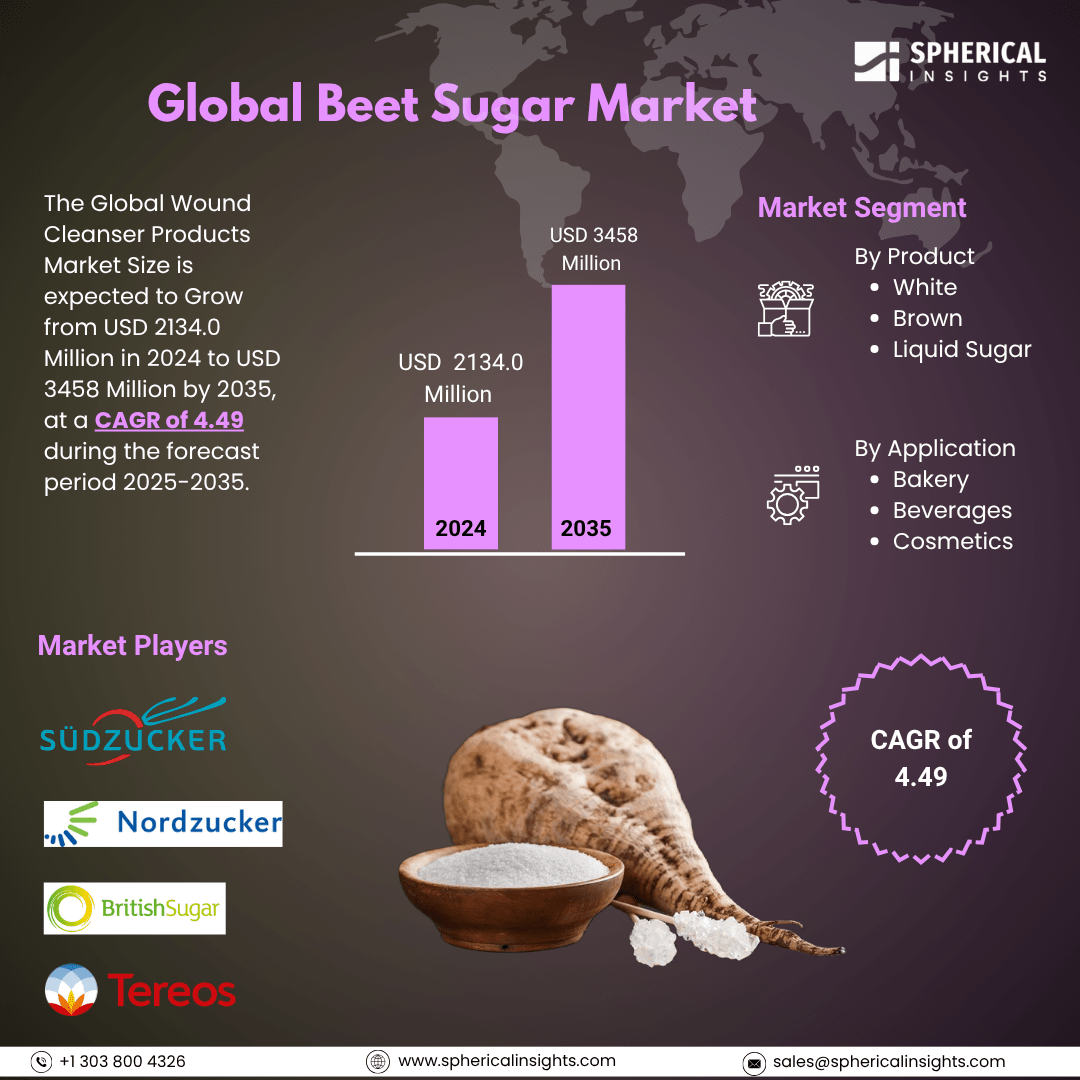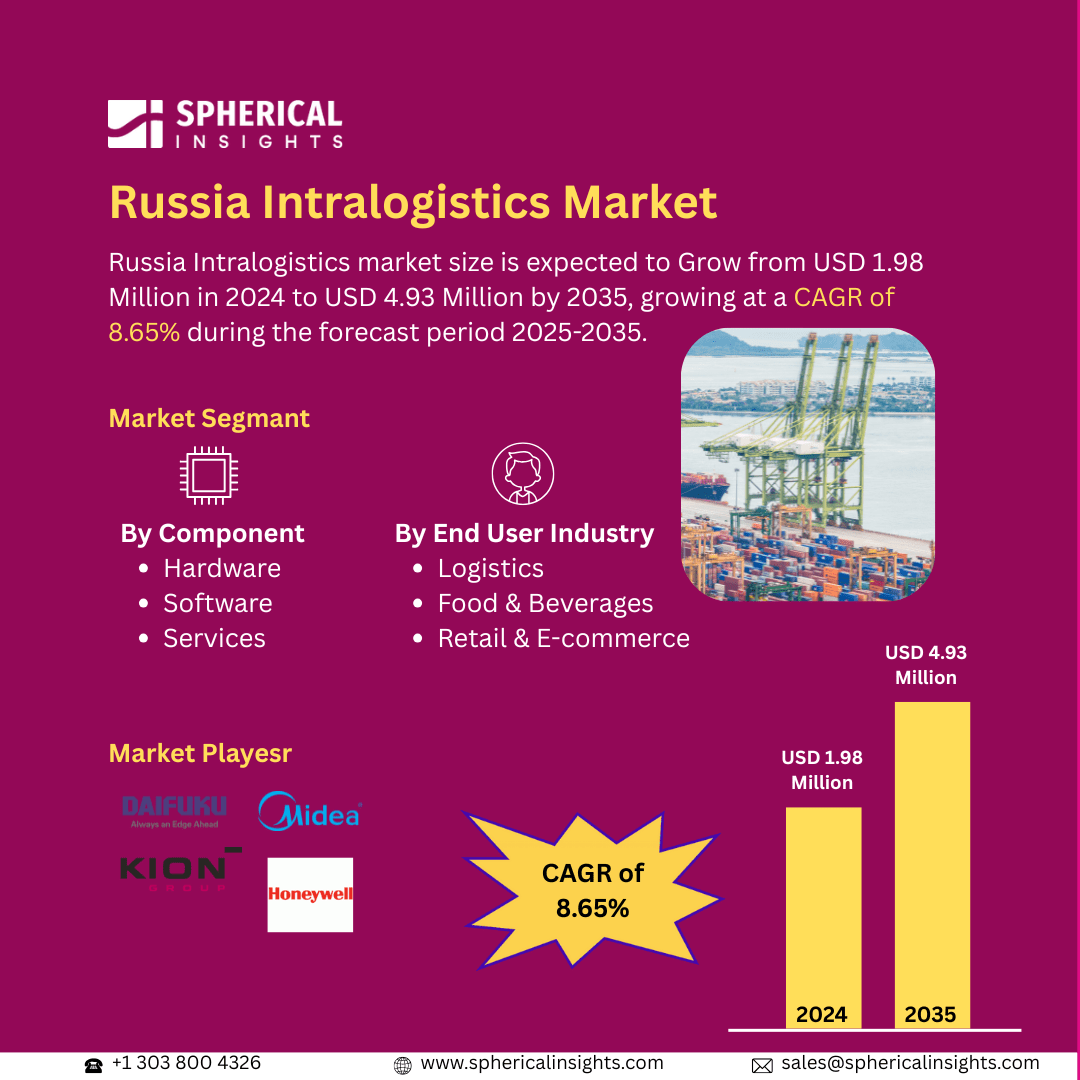Global Beet Sugar Market Insights Forecasts to 2035
- The Global Beet Sugar Market Size Was Estimated at USD 13.55 Billion in 2024
- The Market Size is Expected to Grow at a CAGR of around 7.1% from 2025 to 2035
- The Worldwide Beet Sugar Market Size is Expected to Reach USD 28.83 Billion by 2035
- North America is expected to Grow the fastest during the forecast period.
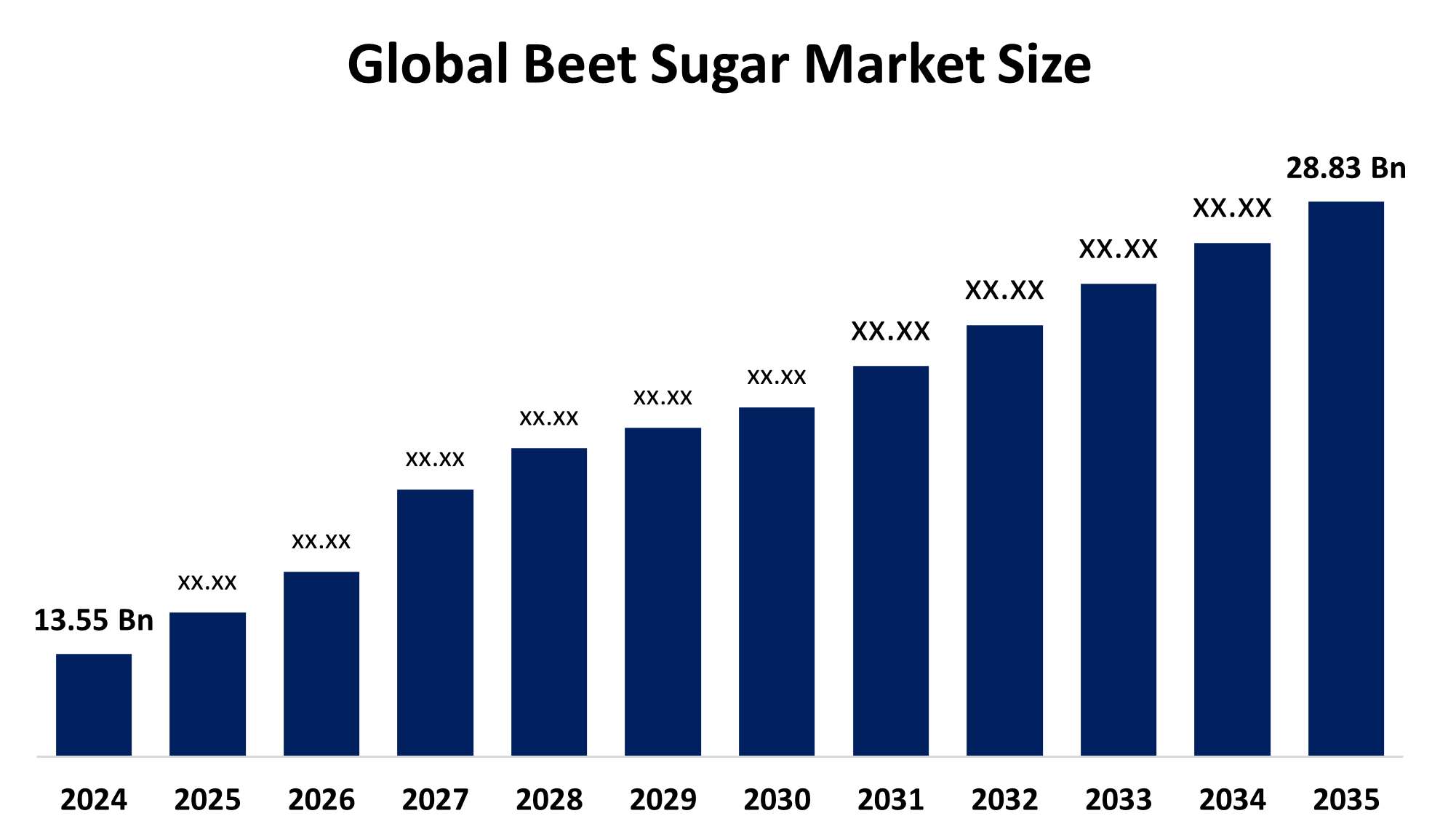
Beet Sugar Market
The beet sugar market involves the production and distribution of sugar extracted from sugar beets, a root crop processed to produce crystalline sweeteners. This sugar serves as an important alternative to cane sugar and is widely used across various food and beverage sectors, including bakery, confectionery, and beverages. Beet sugar is available in multiple forms such as refined white sugar, brown sugar, and liquid sugar, which cater to different industrial and consumer needs. The market is influenced by factors like agricultural yield, advancements in processing technologies, and demand from end-use industries. Beet sugar is valued for its purity and versatility, making it a key ingredient in many products worldwide. Its production and supply chain are critical to ensuring consistent availability and meeting quality standards. Overall, the beet sugar market remains a vital segment of the global sweetener industry, supporting a wide range of applications with a focus on efficiency and product quality.
Attractive Opportunities in the Beet Sugar Market
- Advances in extraction and processing technologies can significantly boost sugar yield and reduce production costs, enhancing competitiveness against other sweeteners.
- Growing consumer interest in organic and sustainably produced beet sugar opens niche markets for premium, environmentally-friendly products.
- Expansion of beet sugar use in biofuels, bioplastics, and other bio-based industries presents new demand avenues beyond traditional food and beverage sectors.
Global Beet Sugar Market Dynamics
DRIVER: Increasing demand for natural and non-GMO sweeteners
The beet sugar market is growing because more people want natural and healthier sweeteners. Beet sugar is seen as a cleaner option compared to cane sugar, which makes it popular with shoppers who care about what’s in their food. New farming methods and better beet plants have made it easier and cheaper to produce beet sugar. Governments also support beet farming by offering help and rules that encourage sustainable growing. Beet sugar is used in many foods and drinks, like baked goods and soft drinks, so as more people eat these products, the demand for beet sugar goes up. Also, beet sugar production is less affected by weather problems compared to cane sugar, so it is more reliable for companies. All these reasons help the beet sugar market to keep growing steadily.
RESTRAINT: Fluctuating prices of raw materials
One major challenge is the fluctuating prices of raw materials, which can increase production costs and reduce profitability for manufacturers. Additionally, competition from alternative sweeteners such as high-fructose corn syrup, stevia, and other artificial sweeteners is intensifying, as these options often offer cost advantages or unique health benefits. Changes in government policies, including subsidies and trade regulations, can also impact beet sugar production and market dynamics. Environmental concerns related to intensive beet farming, such as soil depletion and water usage, may lead to stricter regulations and higher operational costs. Furthermore, shifts in consumer preferences toward low-sugar or sugar-free diets are reducing overall sugar consumption in some markets. These factors combined create challenges for the beet sugar market, potentially slowing its growth despite ongoing demand in certain segments.
OPPORTUNITY: Innovations in processing technologies can improve extraction efficiency
Innovations in processing technologies can improve extraction efficiency and reduce production costs, making beet sugar more competitive. There is also growing interest in organic and sustainably produced beet sugar, opening niche markets for premium products. Expanding the use of beet sugar in emerging industries such as biofuels and bioplastics offers additional avenues for demand. Increasing investments in research to develop disease-resistant and higher-yielding sugar beet varieties can further boost production capabilities. Moreover, partnerships between farmers and manufacturers to promote local sourcing can strengthen supply chains and appeal to consumers focused on sustainability. The rising trend of clean-label products encourages manufacturers to substitute artificial sweeteners with beet sugar, providing a fresh market opportunity. Lastly, expanding awareness and education about the environmental benefits of beet sugar compared to other sweeteners could help increase its acceptance and use worldwide.
CHALLENGES: Vulnerability of sugar beet crops to pests and diseases
One such challenge is the vulnerability of sugar beet crops to pests and diseases, which can severely affect yields and quality. Climate change also poses a significant risk by altering growing conditions, leading to unpredictable harvests and impacting supply stability. Additionally, the lengthy growing cycle of sugar beets compared to other crops can limit flexibility in production and responsiveness to market demand. Infrastructure limitations, especially in regions with less-developed processing facilities, can hinder efficient production and distribution. The high initial investment required for advanced farming equipment and processing technologies can be a barrier for smaller producers. Moreover, market consolidation and competition from large multinational companies can make it difficult for smaller players to compete. These challenges create hurdles in maintaining consistent production and profitability, requiring strategic solutions to ensure the long-term sustainability of the beet sugar market.
Global Beet Sugar Market Ecosystem Analysis
The global beet sugar market ecosystem includes sugar beet farmers, agritech providers, and seed producers who supply improved crops. Processing plants refine beets into various sugar types, while distributors handle logistics. The food and beverage industry is the main consumer, using beet sugar in products like baked goods and beverages. Regulatory bodies shape the market through policies and quality standards. Research institutions and industry groups support innovation and sustainability. Together, these players form a connected network that drives production, supply, and consumption in the beet sugar market.
Based on the product, the white held the largest market share of the beet sugar market over the forecast period
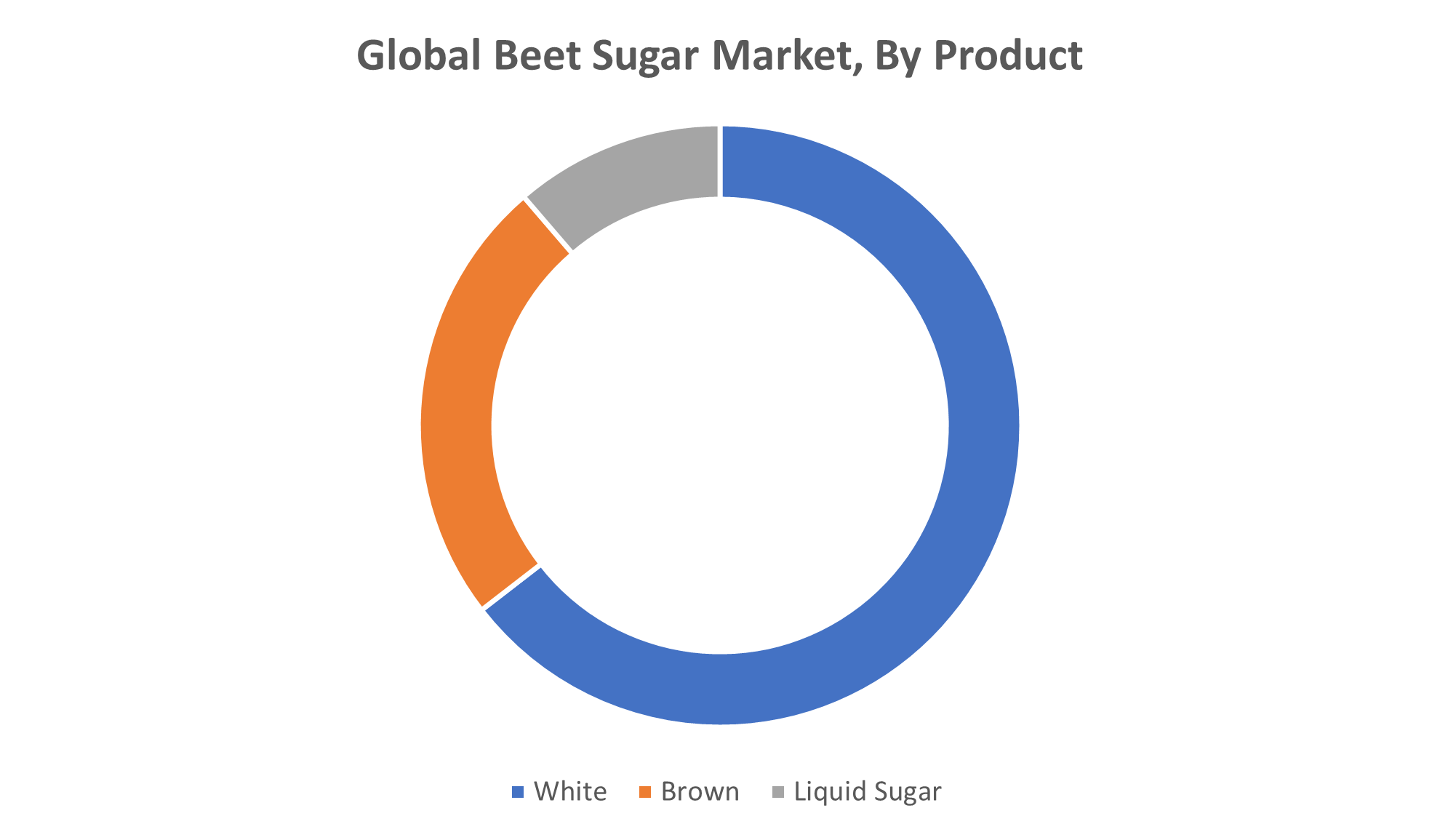
White beet sugar is highly refined, offering a pure and consistent level of sweetness, which makes it ideal for a wide range of applications in the food and beverage industry. Its versatility allows it to be used in baking, confectionery, beverages, and processed foods, where precise flavor and texture are important. Additionally, white beet sugar has a longer shelf life compared to less refined varieties, making it more convenient for manufacturers and retailers. Consumer preference for clean, white sugar that blends well without altering the color or taste of products further boosts its demand. These attributes, combined with established production processes and widespread availability, have ensured white beet sugar’s dominant position in the market throughout the forecast period.
Based on the application, the bakery held a significant market share of the beet sugar market over the forecast period
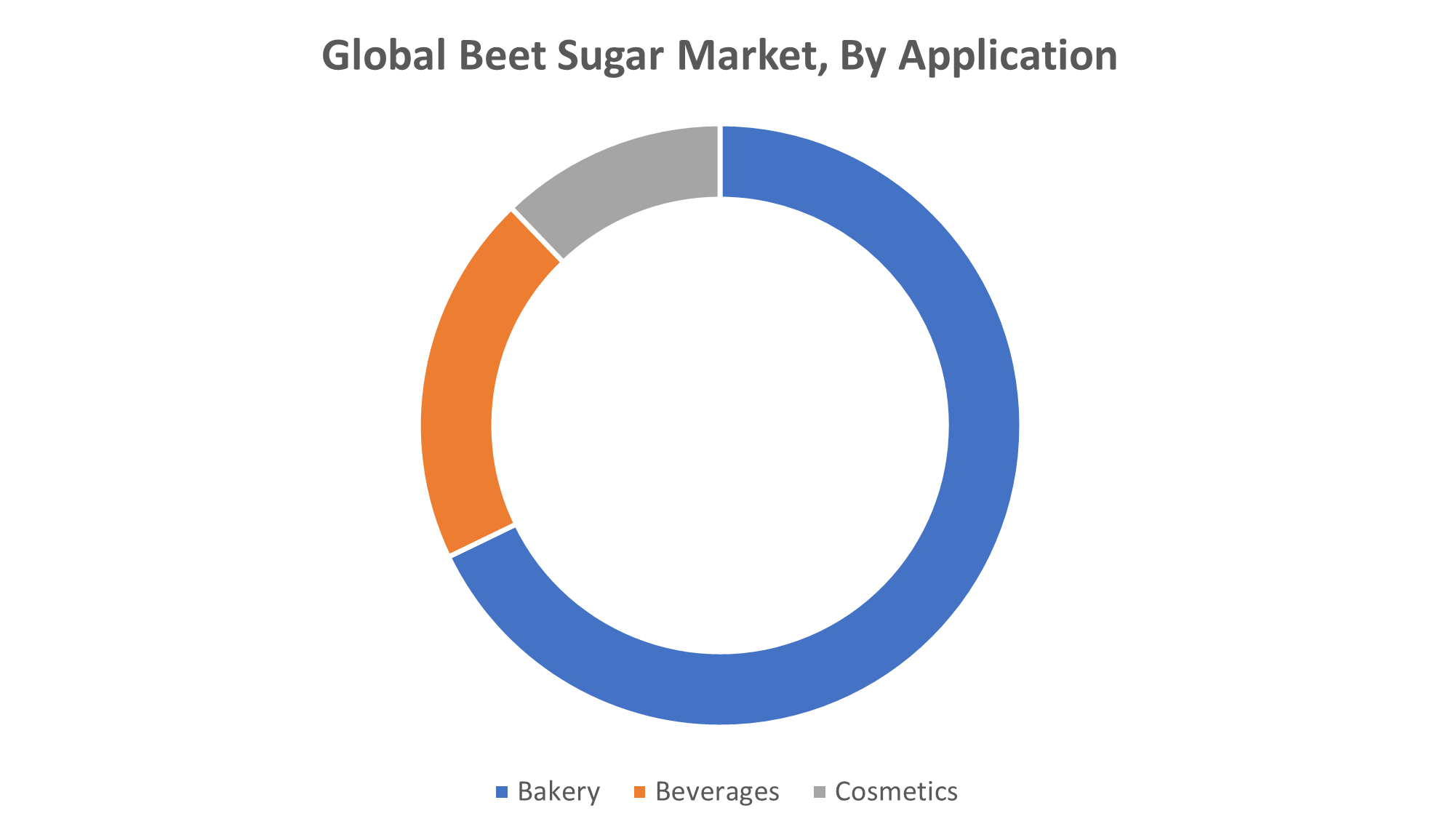
Beet sugar is a key ingredient in bakery products due to its ability to enhance flavor, texture, and color. It helps in caramelization and browning, which improves the appearance and taste of baked goods such as bread, cakes, cookies, and pastries. Additionally, beet sugar acts as a preservative by retaining moisture, extending the shelf life of bakery items. The growing demand for baked goods worldwide, driven by changing lifestyles and increasing consumption of ready-to-eat foods, has further boosted the use of beet sugar in this sector. Its consistent quality and reliable sweetness make it a preferred choice for bakery manufacturers, securing its significant market share in the beet sugar industry.
Europe is anticipated to hold the largest market share of the beet sugar market during the forecast period
Europe is anticipated to hold the largest market share of the beet sugar market during the forecast period. This is largely due to the region’s well-established sugar beet cultivation and processing infrastructure, supported by favorable climatic conditions. Many European countries have a long history of beet sugar production, with advanced technologies and efficient supply chains in place. Additionally, strong government policies and subsidies aimed at promoting beet farming contribute to the market’s growth. The high consumption of beet sugar in various food and beverage applications across Europe also drives demand. Furthermore, increasing consumer preference for locally sourced and sustainable ingredients in Europe boosts the prominence of beet sugar, helping the region maintain its leading position in the global beet sugar market.
North America is expected to grow at the fastest CAGR in the beet sugar market during the forecast period
North America is expected to grow at the fastest CAGR in the beet sugar market during the forecast period. This growth is driven by increasing consumer demand for natural, non-GMO, and sustainable sweeteners amid rising health consciousness. The region's well-established food and beverage industry actively incorporates beet sugar into bakery products, beverages, and clean-label food items to meet consumer preferences for natural ingredients and lower environmental impact. Additionally, advanced agricultural practices and sustainability initiatives support efficient beet sugar production. The rise of organic and plant-based product trends and strategic marketing and e-commerce penetration by smaller brands further fuel market expansion in North America.
Recent Development
- In July 2023, Nordzucker, a Germany-based sugar producer, launched brown organic beet sugar made entirely from North German organic sugar beets. This product is processed without synthetic additives or chemicals, retaining its molasses content for a rich flavor and distinct brown color. It aligns with market trends by providing high-quality, vegan, and regional organic options while meeting the growing demand for brown sugar varieties .
Key Market Players
KEY PLAYERS IN THE BEET SUGAR MARKET INCLUDE
- Südzucker AG
- Nordzucker AG
- British Sugar (Associated British Foods plc)
- Tereos Group
- Cosun Beet Company
- American Crystal Sugar Company
- Michigan Sugar Company
- Amalgamated Sugar Company
- The Western Sugar Cooperative
- Southern Minnesota Beet Sugar Cooperative
- Others
Market Segment
This study forecasts revenue at global, regional, and country levels from 2020 to 2035. Spherical Insights has segmented the beet sugar market based on the below-mentioned segments:
Global Beet Sugar Market, By Product
Global Beet Sugar Market, By Application
- Bakery
- Beverages
- Cosmetics
Global Beet Sugar Market, By Regional Analysis
- North America
- Europe
- Germany
- UK
- France
- Italy
- Spain
- Russia
- Rest of Europe
- Asia Pacific
- China
- Japan
- India
- South Korea
- Australia
- Rest of Asia Pacific
- South America
- Brazil
- Argentina
- Rest of South America
- Middle East & Africa
- UAE
- Saudi Arabia
- Qatar
- South Africa
- Rest of the Middle East & Africa
